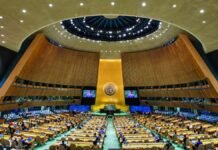
Key Points:
- India joined 142 countries in supporting the landmark “New York Declaration” on September 13, 2025, marking a notable shift from its previous abstentions on Gaza-related resolutions
- The resolution calls for immediate ceasefire, Hamas disarmament, and establishment of a sovereign Palestinian state alongside Israel
- Only 10 countries opposed the resolution, including Israel, the US, Argentina, and Hungary, while 12 abstained
- The vote comes one day after Netanyahu declared “there will be no Palestinian state” and approved West Bank settlement expansion
- France will formally recognize Palestine at the September 22 UN summit, with several other European nations expected to follow
United Nations: India on Friday voted in favor of a United Nations General Assembly resolution endorsing the New York Declaration on the peaceful settlement of the Palestine question and implementation of the two-state solution. This marks a significant departure from India’s recent diplomatic stance, as New Delhi had abstained from four Gaza ceasefire resolutions over the past three years.
The resolution, co-sponsored by France and Saudi Arabia, received overwhelming support with 142 nations voting in favor, while only 10 countries opposed it and 12 abstained. India was notably the only country in South Asia, BRICS, or the Shanghai Cooperation Organization to previously abstain from Gaza ceasefire votes, making Friday’s supportive vote particularly significant.
Overwhelming Global Support Despite Strong Opposition
The New York Declaration garnered unprecedented international backing, with countries across all continents supporting the initiative. The resolution faced strong opposition from Israel, the United States, Argentina, Hungary, Micronesia, Nauru, Palau, Papua New Guinea, Paraguay, and Tonga.
French President Emmanuel Macron hailed the vote as creating an “irreversible path toward peace” and announced plans for a high-level conference on September 22, 2025, where France will formally recognize the State of Palestine. Several other European nations, including Malta, Canada, and the United Kingdom, have indicated they may follow suit with conditional recognition.
The Declaration’s Comprehensive Framework
Core Components of the Roadmap
The seven-page declaration establishes a detailed framework with concrete, time-bound, and irreversible steps toward achieving a two-state solution. Key elements include:
Immediate ceasefire in Gaza and release of all Israeli hostages held by Hamas. The declaration demands Hamas “end its rule in Gaza and hand over its weapons to the Palestinian Authority” as a prerequisite for peace.
Palestinian Authority reforms and full reconstruction of the Gaza Strip under international supervision. The framework calls for deployment of a temporary UN stabilization mission to protect civilians and guarantee peace accords.
Normalization of relations between Israel and Arab states, coupled with collective security guarantees for the region. The declaration emphasizes that “Gaza is an integral part of a Palestinian State and must be unified with the West Bank”.
Condemnation of Violence from Both Sides
The declaration strongly condemns Hamas’s October 7, 2023 attack on Israel, which killed 1,200 people and resulted in over 250 hostages being taken. Simultaneously, it criticizes Israel’s retaliatory attacks in Gaza, describing them as creating a “devastating humanitarian catastrophe” involving siege, starvation, and attacks on civilian infrastructure.
Israeli and American Rejection
Netanyahu’s Defiant Response
Israeli Prime Minister Benjamin Netanyahu delivered a forceful rejection of Palestinian statehood just one day before the UN vote, declaring “there will be no Palestinian state” during a West Bank settlement expansion ceremony. Netanyahu signed agreements to expand the Ma’ale Adumim settlement by over 7,000 housing units, stating “This place is ours”.
Israeli Foreign Ministry spokesman Oren Marmorstein dismissed the resolution as proof that the UN has become “a political circus disconnected from reality,” particularly criticizing the declaration’s failure to explicitly classify Hamas as a terrorist organization.
United States Opposition
The US Mission to the United Nations opposed the New York Declaration, with American diplomat Morgan Ortagus calling it a “mere political show” that could be considered “a gift to Hamas”. The US argued the declaration engages in “disturbing moral equivalence” and fails to recognize that Hamas terrorism was the root cause of the current conflict.
Historical Context and India’s Evolving Position
India’s Traditional Palestine Support
India has historically maintained strong support for Palestinian statehood, becoming the first non-Arab country to officially recognize Palestine in 1988. However, India’s recent voting patterns had shown increasing reluctance to directly criticize Israeli military actions in Gaza.
Between October 2023 and June 2025, India abstained four times from UN resolutions calling for Gaza ceasefires, drawing criticism for avoiding direct calls to halt hostilities. This abstention pattern was attributed to India’s growing defense and intelligence cooperation with Israel, as well as shared concerns about terrorism.
Changing Regional Dynamics
Friday’s vote signals India’s realignment with international consensus as Arab opinion consolidated against Israel’s Gaza operations. The massive civilian casualties in Gaza and Israel’s increasingly isolated position internationally appear to have influenced India’s decision to support the two-state solution framework.
Upcoming September Summit and Recognition Wave
France Leading Recognition Efforts
President Macron has committed to formally recognizing Palestine at the September 22, 2025 UN General Assembly summit, which will be co-chaired by France and Saudi Arabia. This follows the July 2025 international conference that adopted the New York Declaration framework.
Currently, 147 out of 193 UN member states already recognize Palestinian statehood, representing 76% of the international community. The upcoming summit could see additional European nations join this recognition, potentially including Malta, Luxembourg, and conditionally the United Kingdom and Canada.
Implementation Challenges Ahead
While the New York Declaration provides a comprehensive roadmap, significant obstacles remain for implementation. Israel’s current government has consistently rejected any form of Palestinian statehood, with the Knesset passing a resolution in July 2024 that formally rejected Palestinian state establishment.
The declaration’s success will largely depend on international pressure and sustained diplomatic engagement to bring both Israeli and Palestinian leadership to negotiations table. The September 22 summit aims to build on Friday’s momentum by securing additional state recognitions and concrete implementation commitments.





















































